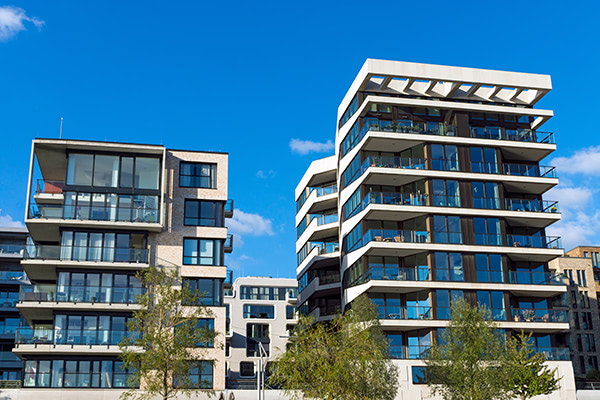When envisioning your dream home, you typically have a specific image in mind, including the layout, amount of space, landscaping, design, location, and even maintenance levels. Your dream home could be a stand-alone home that you have ingrained in your mind, and for others, it could be a duplex/triplex, townhouse, a condo or even a micro-condo.
For some, the appeal to living in smaller homes is growing as we become more conscious of our environmental footprints and become increasingly urban. So, while you’re on the hunt for your new home you may be wondering what type of property you’re looking for. What level of maintenance are you looking to put in? What are the pros and cons of the different property types? And of course, how does this affect your mortgage application?
Different property types will affect your mortgage in different ways. But before we delve into the specifics, it’s good to get some definitions out of the way first.
Let’s chat about the difference between condominium properties and freehold properties.
Freehold properties
The owner of a freehold property owns the home and the grounds it’s built on and is responsible for the maintenance of it.
Condominiums
When we hear the term “condominium,” we often think of high-rise apartments, but the term refers to a type of ownership rather than the type of building. Condominiums are defined by the Canada Mortgage and Housing Corporation as a single unit that belongs to a larger collection of units or buildings. This covers high- and low-rise buildings as well as townhouses, duplexes and triplexes (both attached and semi-attached) as well as single detached homes.
For many, condominium properties are much more attractive than freehold properties. You don’t have to maintain the land and the exterior of the building. Because these properties are often smaller than freehold properties, the price is often lower, making these properties even more popular for those living in big cities.
However, condominium properties also come with monthly fees that can climb as the cost of goods and services rise. For many, the monthly condo fees are a worthwhile trade-off for allowing maintenance outside their unit to be handled by someone else.
How do different property types affect my mortgage application?
There are certain properties that lenders are less likely to approve a mortgage for. Whether freehold or condominium, the hesitancy appears when properties share walls with other properties. This is because there is a higher likelihood of the neighbours affecting the value of the property. Anyone who’s ever lived in an apartment next to a chain-smoker can attest to this.
It’s not just the high- and low-rise apartments that face this stigma. Though, typically, the more units, the higher the assessed risk.
So, what are the different property types?
Duplexes/triplexes
Duplexes or triplexes are units attached to one another. Duplexes are semi-attached, only sharing one wall. Owners of duplexes and triplexes also own the land their property is on. They are smaller than detached homes, and larger than apartments, making them a viable option for families of four or more.
Townhouses
Townhouses are attached units that often have a basement and a yard. They’re often smaller than single-family detached homes and bigger than apartments. The difference is that they are often in rows of four or more units. Like with duplexes and triplexes, townhouses make a great middle ground from a detached home to apartment and are great for families.
There are freehold townhouses, in which you own the land your property is on. You are responsible for the land and the exterior, as opposed to a condo-townhouse where you are responsible only for the interior of your unit.
Condo apartments
As the name states, condominiums are apartments you own. You are only responsible for your unit. You share an entrance, and potentially a lobby, elevators and building amenities with other residents. Condominiums are often 800-900 sq. ft., and are often cheaper than their townhouse counterparts in the same area.
Micro-condos
Like condo-apartments, micro-condos are apartment units where you are responsible for the interior of your unit and you pay condo fees. They are often 600 sq. ft or smaller, hence the term ‘micro.’
As we deviate from the idea of home ownership that has persisted over the last fifty years and reckon with our impact as individuals on the environment, living smaller has become more attractive. The world is different, the average earner makes less money when adjusting for inflation, families are smaller, and we want to live as sustainably as possible. This set of circumstances make micro condos an accessible and attractive option for many who wish to own their property.
Sign us up! Though, it sounds a little too good to be true…
Is it too good to be true?
Micro-condos sound ideal for the modern homeowner. However, the smaller size that makes it a more accessible form of homeownership paradoxically makes them less accessible. Many lenders will not grant a mortgage for a property under 700 sq. ft. As smaller homes become more popular, lenders have to reckon with the new reality. But many, sadly, will still not lend to borrowers for properties smaller than this. One reason, according to mortgagebrokernews.ca, is these tiny properties are still new. Therefore, lenders are simply waiting to see how the market unfolds.
This does not mean you’re unable to secure a mortgage for a micro-condo. Some lenders have different rules for borrowers. This is where a licensed mortgage broker becomes indispensable. A mortgage broker has access to lenders that the public does not. As an experienced professional in the field, they can find lenders willing to spend on stigmatized properties.
If you are looking to get a mortgage for any type of property and are left with questions, please give me a call at (705) 333-4338 or get in touch with me here!
